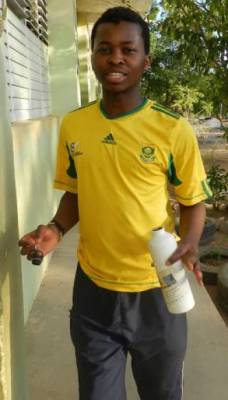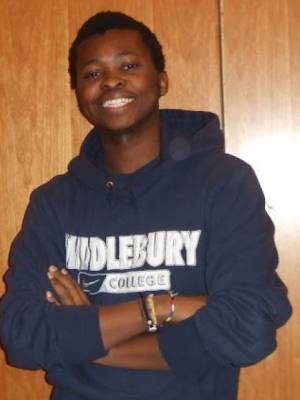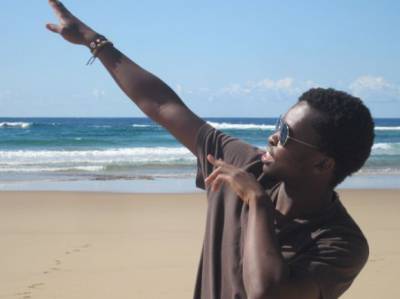Mzwakithi Shongwe was a bright child of about 10 years old, selected to participate in a national debate, hosted by Fundza, the partner of the African Library Project in Swaziland, whose mission is to create communities of young readers. The prize for winning? A library of books for the whole school. Mzwakithi devoured many of the books in that library, and came to understand a world from other people’s point of view. Now, Mzwakithi is studying at Middlebury College in Vermont. His own energy is infectious, and he dreams of the day when he’ll translate all he’s learning into making a real difference for the Swaziland economy. Read Mzwakithi’s inspring story, written in his own words. He is our latest guest blogger.
I grew up in Siteki, a town of about 6,000 people on the border between Swaziland and Mozambique. On a clear day, this town on a hill provides a clear view of the Lubombo Mountains. During my primary school years, when I was about 10 years old, I was selected to participate in a national debate, hosted by FUNDZA, a partner of the African Library Project in Swaziland, whose mission is to create communities of young readers. The prize for winning? A library of books for my whole primary school.

Now, what FUNDZA did exceptionally with these national debates is that they were able to reach out to relatively remote schools like the one I went to in Siteki. This came during a time when it was a norm that all the best opportunities only went to the Manzini and Mbabane metropolitan area. Excitement was high over this competition, which evaluated the ability of the students to articulate their position in English. Although I was one of the younger students (still in 5th grade) in the competition, I was able to snag 3rd place. Bongani Maseko, my debate partner took home first place, and our individual scores ushered us into overall first place. Through the guidance and help of our teachers, we had won a new library for Lubombo Central Primary School. I have only recently learned that the wonderful new library I loved so much as a child was generously curated by book drive organizers in the African Library Project. .
For the first time, we at Lubombo Central Primary School had books to read outside of school time. Our teachers even introduced a ‘library code,’ which was a 30-minute block twice per week in which we would go in to the new library and read books. For me, this was a transformative experience. For instance, I was now able to read books about people from China and India, and I was fascinated by how these people lived their lives in their respective parts of the world. What struck me the most were some of the differences and similarities that both made us separate but one. I think this was one of my first encounters with the idea that one could be a global citizen, learning from other cultures and religions. I loved our library codes, and took many books with me home. I soon found out that the town library a few kilometres away now had an expanded kids’ section. Lacking malls and Playstations, I found myself spending a lot of weekends hanging out in the Siteki National Library. Some of my favorite books there were of myths, such as the one on the Amazonian creation myth about how the world began from an egg laid in a cosmic forest. One afternoon, I stumbled upon a book about sharks! Having grown up in a landlocked country, I found thought of sharks as the true lions of the sea (imagine my sadness when I realized that title had been given to seals). I believe I memorized about 30 shark species from that book. As it turns out, the new kids’ section had also been donated through a partnership with the African Library Project and the Swaziland National Library Association.

I re-entered the debate contest again in the 7th grade. This time, I came home with the first prize, earning more books for Lubombo Central Primary School, as well as the personal prize of a Junior Scrabble (which became a very competitive game between my siblings and I). These FUNDZA debates were rapidly making books cool in the country, especially in Siteki. All of us in Lubombo Central were abuzz with excitement about the stories we were reading about the expansive world beyond Swaziland’s borders. This win had another positive effect: it was one of the reasons I was enrolled with one of Swaziland’s most respected institutions for high school education: Manzini Nazarene High School (MNHS). When I went to MNHS, which had a longer relationship with FUNDZA, he found a more expansive selection of books. My favorite series was the Pacesetter Series, which was a feature of works by prominent African authors. The most memorable and exciting novel from that series was The Equitorial Assignment by David G. Maillu. Many of my female contemporaries at MNHS were fascinated by stories of women breaking cultural norms to achieve success in careers and in love, whereas the boys were more into action books. Two of my close friends, Simiso Dlamini and Temasime Sukati, introduced me to the works of Sidney Sheldon, starting off with Master of the Game, which chronicled the life of a business-savvy woman from the mines of Johannesburg in South Africa to the US. Sidney Sheldon and Robert Ludlum (Bourne trilogy) became an MNHS phenomenon. Their stories were thrilling and exciting, and they seemed to engage some of MNHS’ brightest.

I graduated from high school with scores among the best 10 pupils in the country, and was sponsored by the Swazi national committee of the United World College movement to attend UWC USA and pursue my IB diploma. Currently, I am working to continue the UWC’s mission from my current position as a sophomore at Middlebury College in Vermont. “UWC makes education a force to unite people, nations and cultures for peace and a sustainable future.” Back at UWC USA, I co-founded Platforms for Hope (PFH) with two female friends.

At Middlebury, I am studying International Policy and Economics and am currently expanding my mastery of languages by studying Portuguese. The love for Portuguese stems from my belief that the world’s emerging markets, driven by their energy resources in Portuguese-speaking nations, are part of the future of Swaziland and other South African countries.


